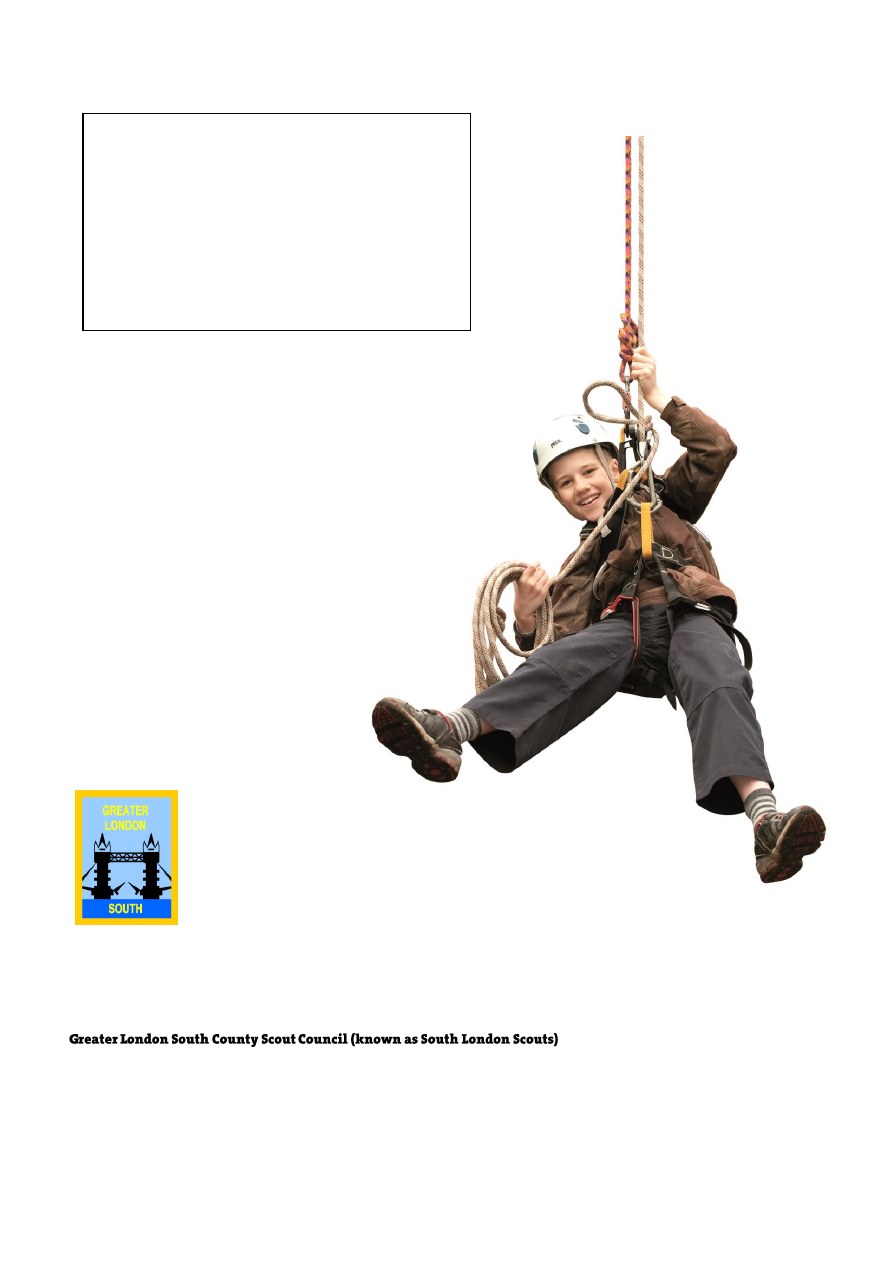
WELCOME
TO OUR
ADVENTU
RE.
Our volunteer agreemen
t:
what you can expect from us
and what w
e expect from y
ou.

1
Why you need to read this…
2
The purpose of Scouting
2
Scouting’s values
2
The Scout method
2
The Scout Promise & Scout Law
3
South London Scouts
3
So who is a volunteer?
4
Adults in Scouting
4
Definitions of Adult Membership
5
Responsibilities and commitments of your appointment
6
Our adult appointment process
7
Repeat Disclosure and Barring Service checks
7
Our commitment to diversity
8
Safety
8
Child protection
8
Data protection
8
UKHQ membership database – Compass
8
Personal expenses
8
Uniform
9
Volunteer expectations
9
Volunteer responsibilities
10
Induction and training obligations of your appointment
10
Insurance
11
Responsible smoking
11
Alcohol in Scouting
11
Blogging and social networking
12
E-mails and text messaging
12
Filming and rights in works created by you
13
Concerns about Scouting
13
Conflicts of interest
14
Review process
14
Suspension of adult membership and Associated Membership
15
Termination of adult membership and Associated Membership
15
Dismissal
15
Exit interviews
15
Your role
15
A final note
16
Adult code of conduct
16
Some dos and don’ts for volunteers
17
Our vision
18
Our commitment and responsibilities
18
Policy history
19

2
Why you need to read this…
Adult volunteers are crucial to the success of Scouting
across South London as without volunteers Scouting
simply wouldn’t exist. With this in mind we realise it is
important for us all to know what we can expect of each
other.
The purpose of this volunteer agreement is to ensure that
you know and understand the policies, processes and best
practices of The Scout Association. Please take some time
to read this intentionally detailed booklet which pulls
together important information from various sources to
provide you with the information you need to know as a
volunteer in Scouting.
If there is anything you do not understand or require
further clarification on, please speak to your volunteer line
manager or visit
www.southlondonscouts.org.uk/volunteering
This agreement is best used in conjunction with the Policies, Organisation and Rules of The
Scout Association (referred to as POR), available to download from
The purpose of Scouting
Scouting exists to actively engage and support young people in their personal development,
empowering them to make a positive contribution to society.
Scouting’s values
As Scouts we are guided by these values:
Integrity
We act with integrity; we are honest, trustworthy and loyal.
Respect
We have self-respect and respect for others.
Care
We support others and take care of the world in which we live.
Belief
We explore our faiths, beliefs and attitudes.
Cooperation
We make a positive difference; we cooperate with others and make friends.
The Scout method
Scouting takes place when young people, in partnership with adults, work together based on
the values of Scouting and:
enjoy what they are doing and have fun,
take part in activities indoors and outdoors,
learn by doing,
share in spiritual reflection,
take responsibility and make choices,
undertake new and challenging activities,
make and live by their Promise.

3
The Scout Promise & Scout Law
Scouting has a simple and positive Promise that all Members are required to make. The
Promise, together with the Scout Law, gives a distinctive ethos to the practices of the
Movement and acts as a bond with Scouts in other countries.
Everyone in Scouting expresses their Membership and acceptance of the values of Scouting
by taking the Scout Promise and following the Scout Law. Beaver Scouts and Cub Scouts
have their own version of the Promise and Law, which is relevant for their age.
The Promise is something that we do and the way in which we live our lives. It is not
something that we just say on occasions. It is important that the words of the Promise and
the Law mean something to the people making them. The words in the Promise and Law
might therefore change over time. This is to ensure that today’s Members understand them
and that they cater for diverse backgrounds and cultures.
The Scout Promise
(for Scouts, Explorer Scouts, the Scout Network and adults)
On my honour,
I promise that I will do my best
to do my duty to God and to The Queen,
to help other people
and to keep the Scout Law.
The Scout Law
1. A Scout is to be trusted.
2. A Scout is loyal.
3. A Scout is friendly and considerate.
4. A Scout belongs to the world-wide family of Scouts
5. A Scout has courage in all difficulties.
6. A Scout makes good use of time and is careful
of possessions and property.
7. A Scout has self-respect and respect for others.
Scouting is open to people of all faiths and of none and we therefore take in to account the
different religious obligations of our Members while upholding the essential spirit of the
Promise.
Further details of the alternative wording of the Promise that young people and adults may
wish to use to best reflect their own beliefs can be found in the current edition of the Policy,
Organisation and Rules of The Scout Association.
South London Scouts
Greater London South County Scout Council, known as South London Scouts,
is an
unincorporated association (registered charity no. 303883) constituted in accordance with the
rules of The Scout Association. It exists to provide leadership, advice and support for its Scout
Districts and Scout Groups (autonomous charities within the provisions of the same rules), in
the area covered by the London Boroughs of Royal Greenwich, Lewisham, Southwark,
Lambeth and Wandsworth.
South London Scouts engages over 1,500 volunteers who carry out a variety of roles at
County, District and Group level and we recognises the important contribution our volunteers
make to the ongoing success of Scouting in our local communities. We believe in investing in
all our volunteers, and aim to provide appropriate ongoing support and training to enable

4
you to develop your skills in order to enhance your volunteering work within Scouting across
Greater London South Scout County.
This agreement seeks to:
identify how South London Scouts and its Districts appoints and involves volunteers,
demonstrate our strong commitment to supporting our volunteers,
clarify what volunteers can expect from South London Scouts and its Districts and
Groups and in return what is expected of them,
signpost volunteers to a range of policies and resources that have been designed to
support their engagement within South London Scouts on a local and national level.
So who is a volunteer?
Usually the definition implies that you
‘give your time freely for the benefit of others’. The
Scout Association is an organisation made up of volunteers who give freely of their time
because they are committed to the aims and principles of the Movement and enjoy working
with young people in our informal educational context.
Scouting is made up of many different types of volunteers some are members, others are
associate members or supporters and others are parents or young people wanting to do
something to help achieve the aims and principles of the Movement. Some are not even
aware that they are doing this whilst others view this as their lifetimes challenge.
Volunteers come to us in various ways but clearly share these common objectives. As a
member of your local Scout Group, Scout District and Greater London South Scout County
you may not recognise this volunteering aspect to your membership, however it is
increasingly evident in today’s world that we need to understand some fundamental
principles of volunteering and recognise, value and celebrate our volunteers and their
achievements.
This volunteering agreement has been developed with this in mind and complements the
additional guidance papers available on roles and responsibilities to further develop our work
with young people.
Adults in Scouting
Adults are the lynchpin of Scouting. All adults in Scouting are 'leaders' in the sense of
'leading the young people'. Without the adult 'Leaders' Scouting would simply not exist. All
people taking adult roles in Scouting must be aged over 18.
Some of the ways Adults support Scouting are:
working directly with the youth membership, by being a
Leader, Assistant Leader, Sectional Assistant, Occasional
Helper or by being part of an Active Support Team,
support the adults in their roles, by providing technical or
personal support, these people are usually Group Scout
Leaders, Skills Instructors, District Commissioners and
their Assistants and the Scout Active Support Team,
run the administrative side of Scouting. Every Group,
District and the County has a 'business' side, and
therefore people take on roles as Chairman, Secretary,
Administrator and Treasurer, or as a member of Group or
District sub-committees.

5
Adults in Scouting are from all walks of life. The one thing they share is the enjoyment of
working together and helping young people reach their potential.
Whilst all our volunteers are passionate about what they do, many help out on a flexible basis
due to other commitments. Some may help out once a week or fortnight whereas others help
once a month, term or at the annual camp.
To carry out our work we seek to appoint effective and appropriate leaders and supporters,
all of whom are required to accept fully the responsibilities of their commitment.
We recognise the important contribution that our adult volunteers make to our organisation.
We believe that we should invest in our volunteers. To this end, we provide regular and
on-going support, supervision and training, to enable volunteers to develop their skills, both
in order to enhance their volunteering work with us and to help them contribute to the wider
community.
Our overriding considerations when making all appointments in Scouting is the safety and
security of our young people, and their continued development in accordance with the
purpose of the Association.
Accordingly, all those whom we accept as volunteers must be “fit and proper‟ persons to
undertake the duties of the particular role to which they have been appointed (including, if
relevant, meeting the requirements of the Sponsoring Authority) and, where appropriate, the
responsibilities of membership.
All volunteers, regardless of their level or length of involvement, have rights and
responsibilities to work within the policies of The Scout Association. This includes any
involvement in a variety of decision making bodies, the payment of out of pocket expenses
(where possible), and access to grievance procedures.
Definitions of Adult Membership
There are two types of adult membership of The Scout Association – Member or Associate
Member. Adults who are prepared to follow the Association's principles may become
Members or Associate Members of the Scout Movement (subject to the rules contained
within POR).
Members:
Adults who, by choice or because of the requirements of their appointment, become
Members of The Scout Association, make the Scout Promise.
Members of the Movement may:
wear the approved adult uniform and associated badges, (see below),
wear the World Membership badge,
receive benefits provided by any Group, District, and County to which the Member
belongs and of The Scout Association and the World Organisation of the Scout
Movement.
When an individual becomes an adult Member that person becomes a member of a Group,
District and County (as appropriate). They also become a Member of The Scout Association
and of the World Organisation of the Scout Movement.

6
Associate Members
Adults who volunteer with Scouting but do not have the requirement of being a member of
the Association as part of their appointment may choose to become Associate Members of
The Scout Association. This involves signing an Associate Members declaration but they do
not have to make the Scout Promise.
Associate Members of the Movement may:
wear the approved adult uniform and associated badges, (see below)
but cannot wear the World Membership badge,
receive benefits provided by any Group, District, and County to which the Member
belongs.
When an individual becomes an Associate Member that person becomes an Associate
member of a Group, District and County, (as appropriate). They also become an Associate
Member of The Scout Association.
There is no maximum age limit for adult membership but all appointments are subject to a
minimum age limit of 18 years. No individual aged 18 or over may be permitted to undertake
any responsibilities or involvement within Scouting until the appropriate enquiries have been
made, (see below).
Members or Associate Members do not have any rights, actual or implied, to take part in the
national management of The Scout Association or the World Organisation of the Scout
Movement.
Responsibilities and commitments of your appointment
All new appointments within Scouting involve a number of responsibilities and commitments
and everyone taking on a new role in Scouting will have hopes and expectations. Some of
these will be realised and some won't. Therefore, a realistic compromise needs to be worked
out and we call this a 'mutual agreement'.
The success and quality of the partnership between our new adults and Scouting will
ultimately depend on how open it is. From the outset, the mutual agreement needs to explain
what we expect from you and what you expect from Scouting. We also need to be clear
about what help and support Scouting can provide you in your role.
This volunteer agreement is a step towards this and covers the overarching aspects of
volunteering with Scouting in South London but you need to discuss more local matters with
your line manager. A good mutual agreement consists of:
a description of the role you have agreed to undertake,
the specific tasks involved and the time we expect them to take,
details of the support required and expected,
an agreed date when we will review the agreement,
an understanding that you, as a new person to Scouting, accept the
fundamentals of Scouting and this volunteer agreement,
what we hope to offer.

7
Our adult appointment process
All adults wishing to hold an adult appointment in Scouting must complete the Association’s
Adult Information Form and will start their journey through our appointments process. There
are four stages to the adult appointment process, these are:
• Application: where a line manager agrees to support an adult applying for an
appointment.
• Approval: where independent checking, (the successful outcome of the Disclosure and
Barring Service (DBS) record check and (where appropriate) two references), concludes
that the person is suitable for an appointment.
• Appointment: following a meeting with the appropriate appointments panel
• Induction: where the line manager ensures that the adult receives a welcome and
induction in Scouting.
All adults, no matter what their role, will go through the stages of the appointment process
and will be provided with information on the key policies of the Association and the training
obligations of the role they are applying for (as applicable).
Adults who are volunteering some of their time to Scouting on an ‘occasional basis’ in
‘regulated activity’, (as define by the UK Government as: on 4 or more days in a 30-day
period, or overnight), or may have unsupervised access to young people, or will have
involvement with the handling or management of money, but are not adult member of the
Association are required to complete an enhanced DBS record check through The Scout
Association.
The Scout Association does not accept DBS criminal record checks from other organisations.
This is because the nature of the information that may be
d
isclosed on a
S
cout DBS criminal
record check may differ from that provided to another organisation.
Our checks are an important part of the process in order to safeguard our young people, as
well as giving assurance to parents and the general public. New volunteers (members or non-
members), must not attend any organised residential events until their DBS disclosure has
been successful.
We seek to be open and accessible to all. A lack of experience or a criminal conviction will not
necessarily prevent an individual from volunteering. This will, however, depend on the nature
of the position and the circumstances and background of their offences.
Repeat Disclosure and Barring Service checks
DBS record checks provide a snapshot in time and have limited validity. In the Association a
DBS record check is valid for up to five years. So, all adult members must complete a repeat
check at least in five year intervals.
We will contact you regarding your DBS renewal a few months before it is due. New DBS
checks may also be required in certain circumstances (e.g. following a suspension or on the
request of a commissioner or UKHQ).
A further criminal record check is not necessary if an individual moves from one appointment
to another within England and Wales, Scotland or Northern Ireland, provided there is a valid
check for the initial appointment, and the individual has had no break in service.

8
Our commitment to diversity
We are firmly committed to diversity in all areas
of our work. We believe that we have much to
learn and gain from diverse cultures and
perspectives, and that diversity will make our
organisation more effective in meeting the
needs of children, young people and adults.
We are committed to developing and maintaining an organisation in which differing ideas,
abilities, backgrounds and needs are fostered and valued, and where those with diverse
backgrounds and experiences are able to participate and contribute.
Safety
We are committed to being a leading organisation in health and safety management.
Together, we can all help to ensure the health and safety of ourselves and others. This is why
you are expected to follow our safety in Scouting guidance which is detailed in the ‘Staying
Safe checklist’ that accompanies this agreement.
Child protection
We have a clear code of behaviour called ‘Young people first’, a copy of which accompanies
this agreement. This applies to all adults working in Scouting, regardless of their role. This is
also included in the training that you will receive and provides guidelines about how young
people should be treated. We expect everyone to follow it.
The Law and Scouting - A duty of care
Under the terms of the Children Act 1989, Leaders have a duty of care towards the young
people in their custody. This means that adults should adopt a common sense approach
when dealing with injuries and illnesses. If you act reasonably when dealing with a problem, it
is unlikely that you can be accused of unreasonable action after the event.
Data protection
We hold and process data on you for a number of purposes connected with your role as a
volunteer, and in taking up your appointment you consent to the Association retaining your
personal data during your membership and also beyond to facilitate any present or potential
future involvement with Scouting. We make every effort to ensure that any data held about
you is accurate, relevant and not misused. The Scout Association is registered as a data
controller.
UKHQ membership database - Compass
Once your appointment has been made full it is your responsibility to keep your personal
details up to date on the national membership database which is called Compass. This will
ensure you are kept up to date and informed of what’s going on. You can register and login
to Compass at
Personal expenses
We strongly believe that expenses and fees should not be a barrier to any adult’s participation
in Scouting, and in principle volunteers should not be out of pocket. Please refer to local
policy on personal expenses for more information.

9
Uniform
Scouting is a uniformed organisation. Therefore, uniform
appropriate to your role should be worn as detailed
below:
Items of official uniform:
stone long sleeve or short sleeve shirt or blouse,
Group / Explorer Scout Unit / Scout Network /
District / County / Gilwell / Scout Active Support
scarf (as entitled) or, on formal occasions a blue
tie is available to wear,
Scout, Young Leaders or Explorer Award belt.
Items of official uniform for which there is a personal choice:
navy blue activity trousers; or
smart navy blue trousers (any high street brand); or
smart navy blue skirt.
Optional items a Group / Explorer Scout Unit / Scout Network / Scout Active Support Unit may
decide to have as part of its official adult uniform:
navy blue shorts;
grey fleece;
navy blue baseball cap.
Optional items for activity dress:
navy blue sweatshirt;
stone polo shirt
When cultural requirements or religious needs require, members of recognised faith
communities may wear appropriate clothing of a style and fashion in accordance with their
beliefs as part of their Scout uniform.
Volunteer expectations
Everyone who volunteers with Scouting within the Scout County of Greater London South is
entitled to be treated with dignity and respect. You have a right to:
accurate information on Scouting at local and national level,
a clear description of the role you have taken on (role descriptions can be found
at
www.southlondonscouts.org.uk/volunteering
),
a safe working environment,
negotiate a choice of roles and tasks on a flexible basis,
a named person (volunteer Line Manager), you can go to for advice, support
and peer mentoring and a Training Adviser,
protection from exploitation by other volunteers and service users,
say ‘no’ without feeling guilty,
have your contribution valued by all areas of the organisation,
receive constructive feedback on your contribution,
have opportunities to develop skills,
have opportunities for training,
have local Scouting deal with disciplinary and grievance matters,
to volunteer in a friendly atmosphere.

10
Volunteer responsibilities
In return, you are required to commit to Scouting’s values and abide by our organisational
policies, rules and procedures. Specifically, you are expected to:
wear Scout Association uniform as appropriate to your role,
treat everyone associated with Scouting (children and adults) with courtesy & respect,
cooperate with other volunteers and staff,
carry out agreed roles and tasks to the best of your abilities,
be committed, reliable and punctual,
ask for help or support when needed,
follow and adhere to the policies, procedures and rules of The Scout Association,
refrain from public criticism of Scouting,
undertake relevant training as necessary,
exchange information and offer feedback,
notify
the appropriate person if
you
are
unavailable/unable
to
fulfil
your volunteer duty.
All adults in Scouting are expected to operate in accordance with the key policies of The
Scout Association. These are:
The Purpose of Scouting
(the fundamentals),
Spiritual,
Equal Opportunities,
Safety,
Child Protection,
Anti-Bullying,
Development.
Further details on all these policies can be found in the current edition of The Policy,
Organisation & Rules of The Scout Association (
Induction and training obligations
of your appointment
It is likely that while you will already meet many of the
requirements of your new appointment, there will be
other areas where you will need further learning. In
addition to this there may also be subjects for which
training is obligatory. Your line manager and Training
Advisor should discuss appropriate training and learning
requirements and opportunities with you.
We are committed to helping our volunteers develop their skills and knowledge. Training is
provided at County level and as required locally through evening and weekend workshops
and training days. Our current training programme can be found at:
All our volunteers are required to complete training relevant to their role which includes
Getting Started training, this must be completed as soon as possible after starting in your
new role and must be completed within five months from the date of your provisional
appointment being issued.
Upon accepting an appointment in the Scout Association you are required to show, that you
have the skills and knowledge appropriate to your role. For those appointments that require
formal adult training the relevant training modules needed to gain Wood Badge recognition
must be completed within a period of three years. If it is not completed within three years of
the full appointment, the appointment may be cancelled. Further information on our Adult
Training scheme can be found at in the member’s area at

11
Insurance
All our Leaders, Active Support Members and Executive Officers are covered by arrange of
comprehensive insurance policies while taking part in Scouting, these are:
Public Liability,
Personal Accident and Medical Expenses,
Trustees Indemnity,
Further details on the cover these policies provide can be found at:
(Non-members, such as supporters and occasional helpers are not provided with the same
automatic basic Personal Accident Insurance as members.)
Responsible smoking
We understand that our adult members and supporters have the right to smoke and we
recognise that people have a choice.
As an adult in Scouting, you are a role model for the young people in your care. Young
people are impressionable and will inevitably be influenced by adults' behaviour - especially
that of those whom they respect.
Whilst it is understood that it is not illegal to smoke, Scouting is about developing young
people, including their health and welfare. As such, smoking in front of scouts of any age
must be avoided.
Also, the law ensures that all Scouting premises are smoke-free. This includes premises which
are rented on section nights, and also buildings on campsites.
It is important that our adult volunteers do not smoke around young people. Not only does
smoking around young people subject them to passive smoking, but it also increases the fire
risk. If you do smoke, try to refrain from smoking during a section meeting. The majority of
section meetings run for two hours or less and any adult should be able to refrain from
smoking for such a short period of time.
We all have a responsibility to make sure we offer Scouting to young people in a safe
environment. The well-being of the young people in Scouting is paramount and we must
ensure that no young person is subjected to tobacco smoke. Smoking during Scouting
activities or evening meetings by our youth members over the age of 18 should be
discouraged.
Further guidance, including how to deal with young people who smoke, can be found in the
information sheet – ‘The right to smoke-free Scouting’ available to download from:
www.southlondonscouts.org.uk/volunteering
Alcohol in Scouting
All our adults need to be physically and mentally fit to undertake the responsibilities of their
role. When responsible for young people, adults must not drink alcohol.
During ‘off duty’ periods, adults in Scouting also need to take into account the effects alcohol
can have and how it may affect their fitness to fulfil their Scouting duties for the duration of
the section meeting, activity or event.
Further guidance on alcohol can be found in the information sheet – ‘Alcohol and Scouting’
available to download from

12
Blogging and social networking
We understand that it is likely you’ll be keen to use social media to
share your experiences and feelings about being part of Scouting. If
you have a blog or a profile on a social networking site such as
Facebook, Twitter, Flickr, Google+, Foursquare (or any other social
GPS positioning apps) and you have stated that you volunteer for
Scouting, then any comment or opinion you put forward will become
associated with Scouting. This includes but is not limited to blog
entries, photo and video uploads, status updates, tweets, or check-ins.
Of course, we are happy for you to mention that you are involved in Scouting in general
terms. This might include comments such as
‘I’m excited about tonight’s Troop meeting’, or
‘Had great fun working with the Cubs today’. However, we ask that you please avoid
mentioning any real specific details of the operations within your Group or District and
particularly avoid posting negative feelings, comments or points of view on any situation that
may occur.
We also recognise that social media can be useful for specific Scouting projects. Our advice is
that you need to be very conscious of the context in which these sites are used and ensure
the public cannot view any personal information of our members.
When posting on social media sites please always remember that you are representing our
organisation and we trust you, so act accordingly.
Be professional; remember that you are an ambassador for Scouting.
Be responsible; and honest at all times. When you gain insight; share it
with others but only when appropriate.
Be credible; accurate, fair, and thorough and make sure you are doing
the right thing.
Be responsive; in a similar way to how you would respond to a letter or
email. Visit and check frequently the online spaces and feeds where
you/we have a presence or could be mentioned and respond positively
and promptly to the comments and conversations.
Always remember that participation online results in your comments being permanently
available and open to being republished in other media by other people.
You need to be especially careful about those you accept as ‘friends’ on sites such as
‘Facebook’. These sites are essentially designed for peer-to-peer contact. It is vitally important
to ask yourself “Is the content of the messages and photographs available to be viewed on
my profile suitable for young people (or their parents) in my section to see?” If the answer is
‘no’, or even a hesitation then do not put it up.
Further guidance on using social media in Scouting is provided in the information sheet –
‘Social Networking Sites and Scouting’ available to download from
www.southlondonscouts.org.uk/volunteering
E-mails and text messaging
The Internet and mobile phones have changed the way we live and communicate and these
methods can be very helpful when confirming arrangements about activities or events. As
adults in Scouting we need to make the best use of these and new technologies, whilst
protecting both the young people in our care and ourselves from being placed in a
vulnerable position.

13
For Beaver Scouts and Cub Scouts any communications using these channels should always
be addressed to the young person’s parent or carer. Information for those in the Scout and
Explorer Scout Sections may be sent to the young people themselves if necessary, with copies
to their parents or carers.
Before using email or text messaging to communicate with young people gain permission
from their parents/carers to contact them and ask them what the most appropriate methods
of contact for their child is. Remember, that all communication should be in a Scouting
context and before sending an email or a text, ask yourself “would you be happy to copy in
the young person’s parents/carers?” If the answer is ‘no’ then do not send it.
Most young people have a mobile phone and most of them will say they can’t do without it.
With mobile phones also come text messages. Leaders of Scouts and Explorer Scouts may
well find this the best method of sending out quick notices, like asking Members to
remember to bring summer camp fees with them or to remind them of the meeting venue
and time. If you send a text message to any young person, you should once again try to
ensure that the content of the message or call could not be misinterpreted.
If you receive an email or text message from a young person which causes you concern, refer
to our ‘Young People First’ code of good practice in the first instance and follow the guidance
in it. The code is often referred to as the yellow card, a copy is enclosed with this agreement
or it can be found online at
www.southlondonscouts.org.uk/volunteering
Further guidance on emailing and texting young people is provided in the information sheet –
‘Email and Text Messaging Guidance for Leaders’ available to download from
www.southlondonscouts.org.uk/volunteering
Filming and rights in works created by you
As part of your volunteer role, you may be filmed, photographed, or recorded. In taking up
this role, you agree that Scouting (and any third parties who are authorised by us) is entitled
to film, photograph or record you, and that we (and our authorised third parties) will be
entitled to use and reproduce these images or recordings and your name in connection with
Scouting.
Concerns about Scouting
We hope that everyone who comes into contact with Scouting will have a positive
experience. However, it is inevitable that on occasions, concerns may arise which require
investigation. As the majority of Scouting activity takes place locally within our community it
is expected that most of these concerns will be dealt with quickly and courteously in an
informal way by your Section Leader, Group Scout Leader or District Commissioner as
appropriate. However, it is possible that a complaint may arise that requires a more formal
investigation and response. We are committed to seeking to resolve these complaints fairly
and in the best interests of everyone involved.
Should you ever have a concern about a matter within your Section or Scout Group please
initially contact your Group Scout Leader. They will listen to the issues and will do their best
to answer and resolve them. If you do not want to discuss the matter with the Group Scout
Leader, or if they cannot deal with your concerns, or if your query is more serious, your
District Commissioner will assist you.
All formal complaints must be lodged within 3 months of reasonably knowing sufficient facts
about the situation. Our aim is to resolve all issues raised within four weeks of receiving your
concerns. However, this may take longer depending on the nature of the issue. If the
timescale needs to be extended, you should expect to be kept informed of progress.

14
If after receiving a response you are concerned that it was not handled appropriately, or still
consider that you have not had a satisfactory answer, you may express these concerns to the
next level of Scouting using our formal appeal process. So, if your concern was originally dealt
with at Scout Group level this will mean contacting the District Commissioner. If it was originally
dealt with by the District Commissioner, then the County Commissioner should be contacted.
It is the Association’s policy that the original response to a complaint may be reviewed using
our formal appeal process just once. This means that once you have appealed against the
initial consideration or outcome of your original issue, and a review has been undertaken and a
response made to you, the matter will be closed and no further appeal or review will be possible.
Any appeal must be made within three months of being notified of the outcome of the
original consideration. You may be asked to state clearly why you are unhappy with the
outcome of the consideration of your concerns, or dissatisfied with the way it was handled.
We do not accept and investigate anonymous complaints, complaints received from a third
party, (except about youth members), or complaints that are broadly or substantively the
same as previously received complaints. We also do not progress complaints that are found to
be vexatious or malicious.
Conflicts of interest
As a member of The Scout Association you should not engage in any activity or be associated
with any activity, person or organisation which operates against the interests or values of
Scouting, or could be seen to affect your impartiality in carrying out your role. Volunteers are
expected to clear any potential or actual conflicts of interests before joining us. If we are
unable to manage any actual or potential conflict of interest you might have, we may need to
remove you from your volunteer role.
Review process
Most people perform better if they have the opportunity to discuss how they are doing and
where they are going from time to time.
A review in Scouting is simply an opportunity to look at what has happened since you
started in your role, or since your last review, and to see what further support and guidance
you might need. It should not be confused with the performance appraisals that many people
have experienced at work. Reviews can be both formal and informal, depending on what
stage you are at in the course of your appointment.
An informal review is held at least annually, to build on the chats you have during the year. It
is a chance to take stock and plan for the future.
A formal review takes place with your volunteer line manager at the end of your agreed
appointment period although you can be called for a formal review at any time. During the
meeting you will both get the opportunity to express your views. Your review will then go on
to look at the successes you have had in your role, the progress you have made on your
training (if appropriate), where you can best contribute to Scouting in the future and the role
you would prefer in Scouting going forward. The kind of things you will discuss are:
are you happy in your current role?
what challenges have you faced in your role?
do you wish to continue, or would your expertise be best used in another role,
or should you retire from Scouting?
At the end of the review a decision can then be made about your future role, and any
support that you will require.

15
Suspension of adult Membership and Associate Membership
Suspension of Membership or Associate Membership is a neutral act intended to protect all
persons involved. It assists to ensure that any investigation or inquiry proceeds in as fair and
objective manner as possible by preventing situations arising which could give rise to further
concerns or allegations or which could potentially cause further compromise.
Suspension may be necessary in the following circumstances:
when an allegation is made that a Member or Associate Member has committed a
serious criminal offence,
when a disagreement or dispute between adults remains unresolved for a period of
more than 30 days,
if a Member or Associate Member makes a formal, public challenge to a non-Scouting
organisation, body or forum against the decision or policy,
where the intentional action or inaction of an individual could seriously harm the
reputation of the Movement,
when the action of a Member or Associate Member may constitute gross misconduct.
Termination of adult Membership and Associate Membership
Adult Membership and Associate Membership may be terminated by:
resignation,
in the case of adults not holding a particular appointment, by resolution of the Group,
District or County Executive as appropriate,
in the case of a suspension, failure to observe the terms of the suspension imposed in
accordance with the Policy, Organisation and Rules of The Scout Association,
failure to meet the training obligations of the role within the require time period.
Dismissal
Volunteers who do not adhere to the organisation’s rules or who fail to perform their
volunteer role satisfactorily may be subject to dismissal following a formal review. Anyone in
this situation will be given the chance to discuss the reasons for dismissal with the
appropriate Appointments Panel.
Grounds for dismissal include but are not limited to, gross misconduct, being under the
influence of drugs or excessive alcohol, theft, misuse or unsafe use of equipment, abuse of
co-volunteers and staff, breaches of confidentiality, failure to abide to the policies of the
Association, failure to meet the training requirements for the role or failure to complete the
duties within the role to a satisfactory standard, (further details can be found in the
Appointment Process section of POR).
Exit Interviews
Where possible informal exit interviews will be held with anyone leaving the Movement. The
interview is an opportunity to explore why they are leaving, their experience and any
suggestions they can offer to improve the running of our organisation. Feedback forms are
sent out to people on leaving an appointment and constructive feedback is always welcome.
Your role
By accepting a role in Scouting you will be giving your time to help provide or support
Scouting on an unpaid voluntary basis. This volunteer agreement is binding in honour only,
and is not intended that any employment or worker relationship be created either now or in
the future. You may withdraw your voluntary services at any time and Local Scouting may
cancel its engagement with you at any time using the processes detailed in this agreement.
Whilst we will comply with our statutory obligations to provide insurance and ensure a safe
and secure environment, you are providing your services at your own risk.

16
A Final note
Our volunteers are important to us and It is important that you as a volunteer enjoy your
experience with Scouting and that your needs and expectations are met. If you have
questions, concerns or if you are unhappy about anything, please talk with your line
manager, Group Scout Leader or District Commissioner. Many problems can be sorted out
through discussion.
This agreement reflects the hopes and intentions of the volunteer and the charity, and is not
contractually binding in any way on either party.
Adult code of conduct
All our volunteers are expected to behave in accordance with our code of conduct which is
detailed below. By agreeing to take on a role in Scouting in South London, you agree to
abide by the code of conduct and the policies, rules and procedures which are relevant to
volunteers as detailed in the current edition of Policy, Organisation & Rules and this
agreement.
If you are unable to attend a section meeting or ‘business’ meeting please let
your section leader or the appropriate chair know in good time and preferably at
least 24 hours before.
All adults are required to take responsibility, with the other leaders in their group,
for the activities they provide both indoors and outdoors.
All accidents must be reported to the Group Scout Leader and logged in the
accident book.
No smoking is allowed during section meetings. Any smoking on a designated
break must be away from the activities and young people in a safe place.
Drug/alcohol abuse will not be tolerated.
Adults should try and ensure that all young people have equal opportunities to
take part in activities.
Adults need to be aware of any disruptive, bullying or aggressive behaviour of
any young people, and seek help from others in dealing with them. Try to have a
consistent approach to these throughout the team.
Physical restraint of children is not permissible, unless it is to ensure the safety of
the child, other children, volunteers or other people. All incidents must be
recorded in an incident book and reported to your Group Scout Leader.
If a child talks to you regarding a child protection disclosure or any other personal
issue the correct procedures must be followed. Please refer to our Young people
first code of practice or our County Safeguarding Coordinator for further
guidance.
Any grievances received from parents or members of the public should be
referred to your Group Scout Leader or District Commissioner as appropriate.
You should avoid taking responsibility for young people’s personal belongings.
Adults need to familiarise themselves with all the policies, rules & procedures of
The Scout Association these are available in
The Policy, Organisation and Rules of
The Scout Association, (referred to as POR.) available to download from

17
Some DO’s and DON’Ts for volunteers
DO
think about why you want to volunteer.
DON'T
start volunteering until you know what is expected of you.
DO
ask about local Scouting and where you will fit in.
DON'T
over commit yourself - reliability is vital.
DO
make sure you know to whom you are responsible and to whom you can go
for help and advice.
DON'T
leave because you are fed-up or are having problems. Discuss how you
feel with others in your Group, District or the County.
DO
accept volunteer expenses. You can always give them back
as a donation to your Group if you do not need reimbursing.
DON'T
ever accept money as payment from someone you
have helped in the course of volunteering. Explain to them
that they can make a donation to Scouting if they so wish.
DO
keep any arrangements you have made. If you cannot
make a meeting, or you are going to be late, let others
know in plenty of time.
DON'T
betray any confidences entrusted to you In
the course of your day to day volunteering
(i.e. things discussed at team or Executive Committee
meetings).
DO
enjoy yourself and encourage others who may
be interested in volunteering with Scouting.

18
We are committed to the purpose of Scouting. We are committed to continuing to develop
our Scout Groups so they…
operate a programme that is relevant enjoyable, attractive and locally achievable,
are equally available and accessible to all young people within the 6 to 25 age
range in our communities,
are effectively and appropriately supported by adult volunteers,
are shaped by young people in partnership with adults,
have a positive image and identity,
are growing,
communicate effectively within Scouting and to the community,
are making a positive impact in our communities,
are preparing young people to be active citizens,
are contributing to social change.
Our County and Districts support structures deliver practical services that support and are
accessible to all adults in Scouting whatever their role. These include:
support for the youth programme, including camping and adventurous activities,
growth and development of Scouting across South London,
coordination of our Scout Groups, Explorer Scout Units and Scout Networks,
the formal appointment of adults and ensuring that all our adult volunteers are vetted
before they are authorised to undertake a role in the Movement,
induction, training, motivation, review and development of adults in our Districts,
including delivery of the Associations adult training programme in partnership with the
County Training Team,
the implementation of the policies and rules of the Association,
relationships with other organisations and bodies,
helping young people take part in decision making within our Groups, Districts
and the County,
support for our Scout Active Support Units,
recommendations for decorations and awards,
advice on financial and administrative matters, particularly relating to charity trusteeship,
provide an effective chain of communication between our Scout Groups, Districts,
County, Region and National Headquarters (UKHQ).

19
1
st
edition, first print: January 2015
Produced by South London Scouts County Development Service (County Charity Number 303883)
South London Scout Centre, Grange Lane, Dulwich, London, SE21 7HL
0843 289 1548
volunteering@southlondonscouts.org.uk
southlondonscouts.org.uk
f
facebook.com/groups/gls.scouts
Policy History
Version 1; January 2015:
Pocket policies accompanying this agreement:
Staying Safe checklist
Young peopled first -
safeguarding a code of practice
Safe Scouting & what to do in
an emergency